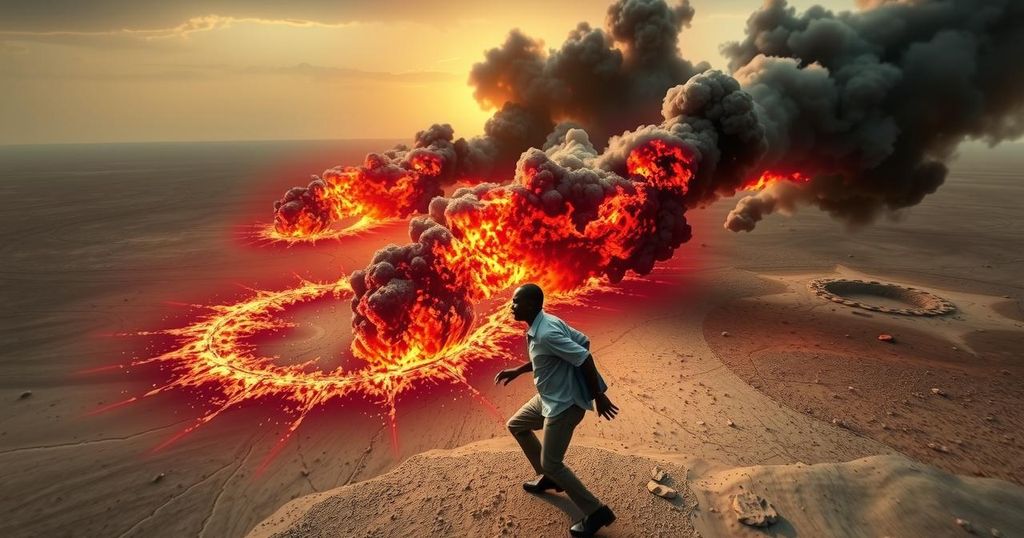Sudan faces a possible de facto partition as the ongoing conflict between its army and the RSF escalates, particularly impacting Darfur. The RSF solidifies its foothold in the west while the army regains control in other regions, prompting concerns about state disintegration. Recent military shifts and international support further complicate the situation, signaling potential long-term ramifications for the political landscape and humanitarian conditions in Sudan.
Sudan is at a critical juncture with the ongoing conflict between its army and the paramilitary Rapid Support Forces (RSF), which has been escalating for nearly two years. As battles continue, analysts indicate that Sudan risks experiencing a de facto partition, particularly splitting Darfur from the rest of the nation. The RSF has fortified its positions in the vast western region, which is almost equivalent to the size of France, while the army gains control in other territories. Such a division might reinforce local conflicts and further fragment the state of Sudan.
The apparent partition raises concerns about potential governance vacuums and localized violence. Kholood Khair, founder of Confluence Advisory, warned that if the split solidifies, it could significantly hinder efforts to achieve a lasting peace agreement, stating, “A split would be the beginning of the end for Sudan.” The ongoing turmoil has already inflicted severe humanitarian crises, with a staggering number of casualties, displacements, and food insecurity since the hostilities began in April 2023.
A recent shift in momentum occurred as the Sudanese army retook control of Wad Madani, Sudan’s second-largest city, which had been under RSF control. Reports of human rights violations by the RSF during this period have contributed to its growing unpopularity outside of Darfur, where its support remains robust. Analysts predict that the RSF may further struggle to maintain dominance over strategic locations such as Khartoum, prompting a shift of focus to securing el-Fasher, the North Darfur capital, which remains under siege.
International support has bolstered both the army and RSF as they continue their military engagements, with countries like Iran, Turkey, and Egypt stepping in to aid the army’s resurgence. This foreign involvement has transformed the army into a more formidable force than it was a year prior, according to Khair, as external assistance has enabled advancements in logistics and weaponry. Egypt’s involvement underscores a vested interest in the stability of Sudan under a military-led governance, seeking to stabilize essential regions like Gezira and Khartoum.
In the wider context, if the RSF successfully consolidates control over Darfur, it may solidify its grip on the region for an extended period, complicating the army’s objectives. Analysts assert that the potential abandonment of Darfur by the army could pave the way for entrenched RSF dominance, risking the marginalization of local groups that initially allied with the army against the RSF.
The broader implications of a divided Sudan could lead to intensified internal strife, as factions within both the army and RSF vie for power. Such internal conflicts are already apparent, as seen in clashes among tribal groups allied with the RSF, leading to significant suffering among the civilian population.
As the situation in Sudan evolves, the possibility of total state collapse looms, heightening the urgency for comprehensive diplomatic efforts to restore peace and stability in the region.
The ongoing conflict in Sudan primarily involves the Sudanese Armed Forces and the Rapid Support Forces (RSF), a paramilitary group that has its roots in the infamous Janjaweed militias. Since fighting erupted in April 2023 over control of the country, both factions have engaged in brutal confrontations that have led to humanitarian crises, including mass displacements and high mortality rates. Analysts express concern that these hostilities, if unaddressed, could result in the partition of Sudan, particularly impacting the war-torn region of Darfur, with far-reaching consequences for the country’s stability.
In summary, Sudan stands on the brink of a potential partition as the conflict between the army and RSF intensifies. This division is likely to exacerbate local tensions and hinder efforts for national reconciliation. As foreign nations continue to influence the dynamics on the ground, the implications for governance and humanitarian needs in Sudan are increasingly grim. Without effective intervention and diplomatic solutions, the pathway to recovery remains uncertain and fraught with challenges.
Original Source: www.aljazeera.com






